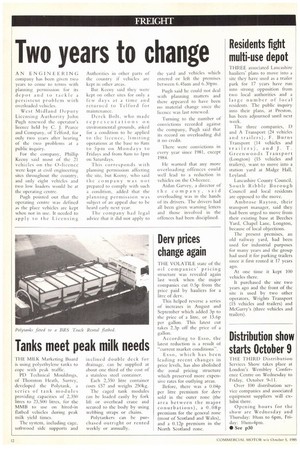Two years to change
Page 14

If you've noticed an error in this article please click here to report it so we can fix it.
AN ENGINEERING company has been given two years to come to terms with planning permission for its depot and to tackle a persistent problem with overloaded vehicles.
West Midland Deputy Licensing Authority John Pugh renewed the operator's licence held by C. J. Pearce and Company, of Telford, for only two years after hearing of the two problems at a public inquiry.
For the company, Phillip Keeny said most of the 21 vehicles on the 0-licence were kept it civil engineering sites throughout the country, and only eight vehicles and two low loaders would be at the operating centre.
Pugh pointed out that the operating centre was defined as the place vehicles are kept when not in use. It needed to apply to the Licensing
Authorities in other parts of the country if vehicles are kept in other areas.
But Keeny said they were kept on other sites for only a few days at a time and returned to Telford for maintenance.
Derek Bolt, who made representations on environmental grounds, asked for a condition to be applied to the licence, limiting operations at the base to 8am to 5pm on Mondays to Fridays and from 8ani to lpm on Saturdays.
This corresponds with planning permission affecting the site, but Keeny, who said the company was not prepared to comply with such a condition, added that the planning permission was subject of an appeal due to be heard early next year.
The company had legal advice that it did not apply to the yard and vehicles which entered or left the premises between 6.45am and 6.30pm.
Pugh said he could not deal with planning matters and there appeared to have been no material change since the licence was last renewed.
Turning to the number of convictions recorded against the company. Pugh said that its record on overloading did it no credit.
There were convictions in every year since 1981, except 1984.
He warned that any more overloading offences could well lead to a reduction in vehicles on the 0-licence.
Aidan Garvey, a director of the company, said overloading was in the hands of its drivers. The drivers had all been given warning letters and those involved in the offences had been disciplined.












































































































